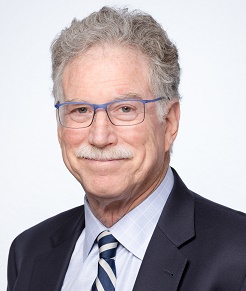Words of Wisdom for Early-Career Interventional Cardiologists
Morton Kern, MD, often engages his colleagues via email in brief, informal dialogue on clinically relevant topics in cardiology.

 Morton Kern, MD, of VA Long Beach Healthcare System and University of California, Irvine, often engages his colleagues via email in brief, informal dialogue on clinically relevant topics in interventional cardiology. With permission from the participants, TCTMD presents their conversations for the benefit of the cardiology community. Your feedback is welcome—feel free to comment at the bottom of the page.
Morton Kern, MD, of VA Long Beach Healthcare System and University of California, Irvine, often engages his colleagues via email in brief, informal dialogue on clinically relevant topics in interventional cardiology. With permission from the participants, TCTMD presents their conversations for the benefit of the cardiology community. Your feedback is welcome—feel free to comment at the bottom of the page.
Colleagues,
A few years ago, Eric Bates and others contributed wisdom from the inaugural generation of interventional cardiologists to Cath Lab Digest. Many provided excellent and poignant words. I was recently asked again to give some words of wisdom for future cardiologists. I thought I’d ask my colleagues to join me. What’s evolved for you over time? What have you learned from your experiences?
Here are mine:
I never thought about evolution, but life as an interventionist (or even a cardiologist in general) thrives on evolution and change. Who could have predicted the extraordinary path that interventional cardiologists would create?
Today, the 10-lb protective lead aprons have disappeared. The fear of unsalvageable coronary dissection leading to emergency CABG hovers smaller in the background. Numerous examples of changes in thought and practice make this career great.
My short version:
1. Be compulsive about your patients. Take no shortcuts.
2. Be curious about why we’re doing something. If there is no good indication, no cath.
3. Be open to new ways of doing something. Don’t be afraid to change an old habit, adopt a new technique, and question conventional wisdom.
4. If the decision is based on reimbursement, please think twice if it’s the right one.
5. To know a thing is to teach a thing. Academics is not the only place to teach.
6. Narcissism isn’t pretty, so avoid it.
Kirk Garratt, MD (ChristianaCare, Newark, DE):
Well said, Mort. The only thing I can think to add: Be humble. The best way to build on your strengths is honest self-assessment and humble inquiry.
Christopher J. White, MD (Ochsner Medical Center, New Orleans, LA):
Let your decisions be guided by evidence, not emotion. Just because you “can” do something, doesn’t mean you “should” do something.
Theodore Bass, MD (University of Florida, Jacksonville):
Talk to your patients about what their goals are involving the perceived benefit of the intervention. It’s important to consider whether their and your expectations and goals are aligned.
Gregory J. Dehmer, MD (Carilion Clinic, Roanoke, VA):
In a tough case, knowing what to do has two parts:
1. How to get out of trouble
2. How to stay out of trouble.
. . . and number 2 is always better than number 1.
John Hirshfeld Jr, MD (Penn Medicine, Philadelphia, PA):
Remember, although it’s superficially easier to justify, the error of commission can be as serious and consequential as the error of omission.
Bonnie Weiner, MD (Saint Vincent Hospital, Worcester, MA):
When things don’t go according to plan, don’t panic or change how you do things. Think before you act, but don’t waste time.
Shyam Sathanandam, MD (Nicklaus Children’s Heart Institute, Miami, FL)
This has been a truly fascinating and enlightening discussion. As a pediatric interventional cardiologist, I often encounter a unique set of challenges—chief among them is that our patients cannot provide consent for themselves. We rely on parents to make the most informed decisions for their child’s health, which inevitably presents complex ethical dilemmas.
I wholeheartedly agree with Chris’s point: just because you “can” do something doesn’t mean you “should.” This resonates especially deeply when caring for infants who cannot voice their needs or preferences.
I would also like to add a few reflections of my own:
1. Our primary responsibility is always to our patients—not to anyone else.
2. Medicine is a team effort. We are never alone in what we do, and our success is built on the strength and support of the team around us.
3. It’s always okay to ask for help. Calling a friend or colleague for advice is not a weakness—it’s wise and often necessary.
4. Don’t forget to care for yourself and your family. Our ability to care for others depends on caring for our own well-being, too.
Barry Uretsky, MD (UAMS Medical Center, Little Rock, AR):
I heard Bill Lombardi say something that I’ve shared many times with our fellows. To paraphrase: The easiest way to make a case long is to take a shortcut.
Charanjit Rihal, MD (Mayo Clinic, Rochester, MN):
I often tell my fellows the way to know if you made the right recommendation to proceed with a procedure in the event of a bad outcome is to ask: if the same (ie, similar) patient were to come in the day after, would you make the same recommendation? This is very important, as it’s ultimately the operator who is medically/legally responsible, not the referring physician.
Carl Tommaso, MD (Retired, Dallas, TX):
Speed and good outcomes are not between your hands but better between your ears.
Peter Block, MD (Emory University, Atlanta, GA):
Learn how to be calm in a crisis—it’s a forced, practiced trait—and rely on those around you to help you through.
Watch out for “conventional wisdom.” It’s a bunch of old guys making pronouncements about remembered outcomes over a glass of port. Individual patients frequently winnow guidelines to unknown answers—do the best you can with what you know and be quick to shift gears if needed.
James Jenkins, MD (Ochsner Medical Center, New Orleans, LA):
Interventional cardiology has never been static, which is one of its greatest strengths as I get bored easily. What began as an experimental discipline has matured into a refined field that blends precision with humanity, and technology with judgment. Guidelines from our field are more rigorously created with more exhaustive data collection than any other field of medicine.
As we look toward the next generation of cardiologists, I would offer the following guiding principles:
1. Treat each patient as if it’s your family.
2. Remember when you perform procedures and spend money in the cath lab that it’s your money, assuming you pay taxes. Be financial responsible, please. Fellows hear this from me on a daily basis.
3. Humility is an asset. You will never be done learning—from your mentors, your peers, and most importantly, from your patients.
4. Mentorship is a duty. Whether formally or through example, each of us shapes the culture of the field. Be generous with your time and honest with your lessons.
5. We are stewards of a field built by courageous thinkers and doers—and it will continue to thrive only if we pair technical excellence with ethical clarity and curiosity.
Michael A. Kutcher, MD (Wake Forest University, Winston-Salem, NC):
There are no real defeats in life unless you surrender and accept them as such. Supposed defeats are really opportunities to learn, to assess, to change, and to get better and better. This will lead to victories in the future.
When faced with a crisis during an interventional procedure, remember that you are a leader. Remain cool, calm, focused, thoughtful, and decisive. The staff are looking to you for a resolution. If you lose your composure, the staff will lose theirs.
David R. Holmes Jr, MD (Mayo Clinic, Rochester, MN):
These are very important. I would add the following.
1. No interventional procedure should ever be labeled as a “slam dunk” no matter how straightforward it looks.
2. There is “no free lunch” with whatever we do in interventional cardiology. Nothing is ever free: someone pays the price and nothing lasts forever.
3. When we talk about “complications” we always need to remember that it is the patient who suffers the “complication,” not the interventionalist.
4. Always have in your mind a “plan B.”
It is an extraordinary field we work in now or have worked in in the past or will work in in the future. It is a gift.
Spencer King III, MD (Emory University, Atlanta, GA):
Know what your goal is in performing a procedure. Why am I doing this? Ask: is the patient on the same page regarding the goal?
Larry S. Dean, MD (UW Medicine, Seattle, WA):
I was told many years ago by a well-known cardiovascular surgeon: “Larry, just because you have a technology doesn’t mean you have to apply it.” That was said in regard to balloon aortic valvuloplasty. It still has meaning today and for the future.
Also, if the data don’t make sense with respect to the patient, ask yourself why before accepting that data.
Mitchell W. Krucoff, MD (Duke University Medical Center, Durham, NC):
1. As Bill Roberts taught me as a med student at the National Institutes of Health in 1978: “Never forget that an implantable medical device is the replacement of one disease with another—hopefully, a less severe one.”
2. No matter how sleek the device or how experienced the operator, there is no such thing as an “atraumatic” intravascular device.
3. You can recognize your ability to transform experience into wisdom in your work when you reach a point in your career where most of the exciting stuff you are learning comes from persons who are younger than you.
4. Finally, here’s my annual message to our graduating interventional fellows. Forty years ago, it was amazing and exciting to manage a bifurcation lesion by placing two guides, one in each femoral, and then alternating each guide and balloon into the coronary ostium and then back it out to use the other, because two balloons would not fit into one 8-Fr guide. This was before stents, before DES, and no one was thinking about percutaneous valves. With the decades of evolution I’ve seen, what blows my mind is to think about what you graduating fellows will be doing 40 years from today. But foremost: may you always love your patients and love what you can do for them when you do your best.
The Bottom Line From Mort Kern
While classical cliches may seem tired, there’s something that is important and true about considering them.
My last words to fellows going into practice, from the singer Kenny Rogers:
“You got to know when to hold ‘em [ie, take the win]
Know when to fold ‘em,
Know when to walk away
And know when to run [ie, stop and finish quick]
You never count your money [ie, don’t gloat until the case is finished]
When you’re sittin’ at the table,
There’ll be time enough for countin’
When the dealin’s done.”
Comments